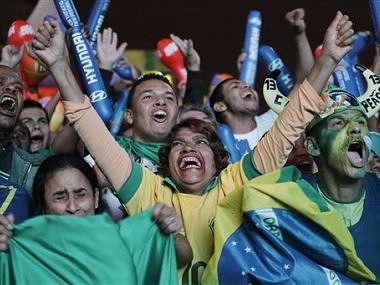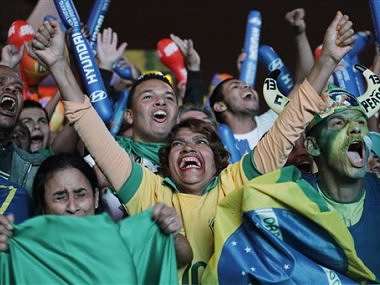The battle of the moods started early in the morning of Sunday, 30th of June. The Maracanã was still a silent circus waiting for the performers to arrive later in the day. But outside the Brazilian protesters were already marching around it from 10 am onwards. The plan was to come together a kilometre away from the stadium and march towards it, even though the official FIFA rules say protesting on match days is forbidden in or around the Maracanã. In Fonte Nova, where Uruguay and Italy were playing for third and fourth place, the protesters also filled the streets around the stadium. They complained about the costs of the World Cup peacefully. The atmosphere was tense, since manifestations were forbidden the police presence had been reinforced and the protesters did not know with what force they would crackdown on them. By the time the Maracanã was filled with Brazilian and Spanish supporters there were five thousand protesters on the outside. There were mixed feelings to say the least – it is difficult to make Brazilians wish their team lose. But the people on the outside say they were cheering for Brazil, just not for the one on the field. They were cheering for a better nation, not a winning football score. [caption id=“attachment_924367” align=“alignleft” width=“380”]
 Brazil soccer fans celebrate their team’s first goal against Spain in the final of the Confederations Cup. AP[/caption] It is no secret that FIFA has been concerned about the protests all through the duration of the Confederations Cup. The pressure of a final and the direct criticism of the World Cup by the Brazilian public was embarrassing enough so containing the situation while two of the best football teams played for a trophy was absolutely essential. Since the week of protests FIFA has been confiscating posters, banners and shirts that had anything to do with the protests. Despite this many people were able to sneak in with messages that were being shouted on the streets. But the most embarrassing FIFA overlook of these protest banners was yet to come in the opening ceremony of the final match. Of course the ceremony had the whole she-bang of sports events closing performances, particularly some dancers dressed as footballs. They carried a curved half of a huge football on their backs, like they were a kind of black and white human turtle. From up in the sky they looked to be balls moving along the field in unison with the music. It was happy, it was hopeful, it was entertainment. I’m sure Blatter couldn’t be happier. Until three turtle dancers whipped out banners against the privatisation of the Maracanã, that is. The banners were quickly snatched off the volunteers’ hands, but they left the field with their fists up in the air in victory. The match itself was electrifying. It started with the national anthem being sung in unison by the crowd even after it was cut short and continued after Fred scored a minute and 35 seconds into the game. The 3-0 result was exciting not only because Brazil was regaining its reputation in football but also because the game was so incredibly balanced. Players of both teams were exceptional. The atmosphere was powerful inside and outside the stadium but in contrasting ways. Police and protesters were already clashing outside and people were bleeding and bruised after being hit with rubber bullets. Of course, most of the protest was peaceful but they were angry. They were angry at what was inside. Angry at the fact that now there are only 75 thousand seats in Maracanã and that the price of the tickets has soared (R$90 to R$300 when the minimum wage is around R$600). Angry at the removal of people from their homes to build more sports facilities. Angry because two sports facilities used by around ten thousand people were destroyed to build a parking lot for the stadium. The happy people left the stadium exhilarated. Seemed like most of the population felt the same, and there is no harm in celebrating. But it’s no reason to ignore all the problems that surrounds us all and the problems that win has brought the population. Tuesday, July 2nd, ‘the day after’ as it was called by the newspaper O Globo has already brought bad news all of us – now there is no division between the inside and the outside of the Maracanã. The stadium has closed so that the finishing touches can be given and there is no prediction as to when it will be opened again. The local teams have nowhere to play. ‘O Maracanã é do povo’, people used to say. It means ‘The Maracanã is the people’s’. But it’s not the people’s anymore, it’s FIFA’s, it belongs to huge corporations that are taking over. And even when it opens, huge chunks of the population won’t be able to attend matches because they will not be able to afford it.
Brazil soccer fans celebrate their team’s first goal against Spain in the final of the Confederations Cup. AP[/caption] It is no secret that FIFA has been concerned about the protests all through the duration of the Confederations Cup. The pressure of a final and the direct criticism of the World Cup by the Brazilian public was embarrassing enough so containing the situation while two of the best football teams played for a trophy was absolutely essential. Since the week of protests FIFA has been confiscating posters, banners and shirts that had anything to do with the protests. Despite this many people were able to sneak in with messages that were being shouted on the streets. But the most embarrassing FIFA overlook of these protest banners was yet to come in the opening ceremony of the final match. Of course the ceremony had the whole she-bang of sports events closing performances, particularly some dancers dressed as footballs. They carried a curved half of a huge football on their backs, like they were a kind of black and white human turtle. From up in the sky they looked to be balls moving along the field in unison with the music. It was happy, it was hopeful, it was entertainment. I’m sure Blatter couldn’t be happier. Until three turtle dancers whipped out banners against the privatisation of the Maracanã, that is. The banners were quickly snatched off the volunteers’ hands, but they left the field with their fists up in the air in victory. The match itself was electrifying. It started with the national anthem being sung in unison by the crowd even after it was cut short and continued after Fred scored a minute and 35 seconds into the game. The 3-0 result was exciting not only because Brazil was regaining its reputation in football but also because the game was so incredibly balanced. Players of both teams were exceptional. The atmosphere was powerful inside and outside the stadium but in contrasting ways. Police and protesters were already clashing outside and people were bleeding and bruised after being hit with rubber bullets. Of course, most of the protest was peaceful but they were angry. They were angry at what was inside. Angry at the fact that now there are only 75 thousand seats in Maracanã and that the price of the tickets has soared (R$90 to R$300 when the minimum wage is around R$600). Angry at the removal of people from their homes to build more sports facilities. Angry because two sports facilities used by around ten thousand people were destroyed to build a parking lot for the stadium. The happy people left the stadium exhilarated. Seemed like most of the population felt the same, and there is no harm in celebrating. But it’s no reason to ignore all the problems that surrounds us all and the problems that win has brought the population. Tuesday, July 2nd, ‘the day after’ as it was called by the newspaper O Globo has already brought bad news all of us – now there is no division between the inside and the outside of the Maracanã. The stadium has closed so that the finishing touches can be given and there is no prediction as to when it will be opened again. The local teams have nowhere to play. ‘O Maracanã é do povo’, people used to say. It means ‘The Maracanã is the people’s’. But it’s not the people’s anymore, it’s FIFA’s, it belongs to huge corporations that are taking over. And even when it opens, huge chunks of the population won’t be able to attend matches because they will not be able to afford it.
Journalist, blogger and Brazilian. Nicole writes regularly about politics, culture, current events, feminism and pop culture. She is an avid Twitter user and doesn't shy away from speaking her mind.
)